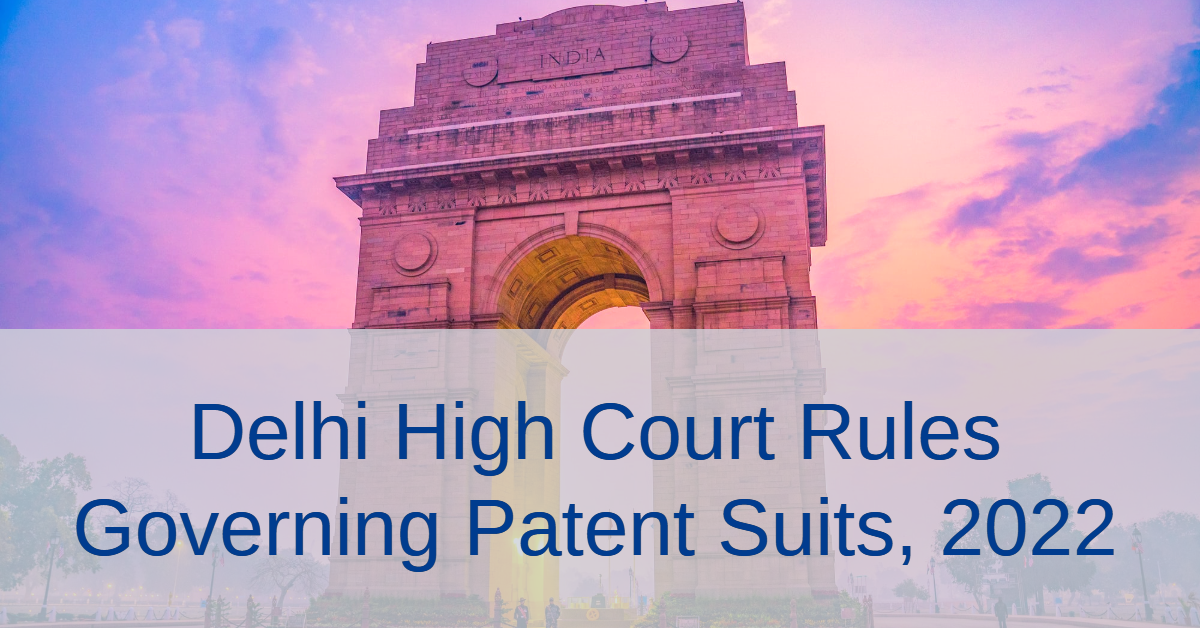Over the last decade or so, there has been a large increase in the number of patent infringement actions filed before the Delhi High Court. The subject matters of these actions pertain to several emerging scientific fields such as pharmaceuticals, diagnostics, mechanical engineering, telecommunications, electrical/electronics, wind technology, etc.
To counter the complexities that arise while entertaining these actions, the Delhi High Court, on February 24, 2022, issued a public notice finalizing the set of rules that govern patent suits. These rules are known as ‘The High Court of Delhi Rules Governing Patent Suits’ and they shall govern the adjudication of all patents suit brought before the relevant courts. The first draft of these rules was released on 27 October 2020 and after receiving comments regarding the same, changes were made, the final draft was composed accordingly and now the rules have been published in the Gazette of India, thereby making them enforceable.
Under Section 129 of the Code of Civil Procedure, s. 158 of the Patents Act, and in pursuance of the provisions under the Tribunal Reforms Act, the High Court of Delhi has rightfully used its power to frame rules relevant to patent suits. However, it has also been reiterated that the substantive procedure pertaining to patent suits are still to be found in the Patents Act 1970, Code of Civil Procedure 1908 as amended by The Commercial Courts Act 2015, and the Delhi High Court Intellectual Property Rights Division Rules 2022. In case any provisions are not found in the rules, then the above-mentioned legislation can be examined for the same.
The High Court of Delhi Rules Governing Patent Suits, 2022 is a set of 17 rules that establishes various definitions relevant to patent prosecution and further, elucidate on their importance. To put forth an illustration, previously, various suits pertaining to patent prosecution were provided for in a short excerpt or so but now the Delhi High Court in its rules has explained the various types of suits and their required documents, namely, Patent Suits, Claim Construction Brief, Invalidity Brief, Infringement Brief, Non-Infringement Brief, and the Damages Brief/Account of Profits Brief. Similarly, several steps of patent prosecution have been explained in detail and the required documents for each step have been clearly stated to ensure that all information is present while matters are deliberated. The requirements in plaints, written statements, counterclaims, replication claims, memos of parties, and affidavits have all been clearly established through these rules. Additionally, the chronology of patent prosecution with regards to the first hearing of a suit, the first, second, and third case management hearing, final hearing, mediation, and summary adjudication, has been stated with all their requirements having been provided accordingly. Other relevant rules would pertain to the Panel of Scientific Advisors and the General Clause of the rules.
Some notable changes between the first draft released in October of 2020 and the final set of rules are as follows –
- The invalidity brief has been explained in greater detail. The procedure regarding invalidity being claimed under Section 64 of the Patents Act has been added. Additionally, if a ground of invalidity had previously been dealt with by the Office of ‘Controller General of Patents, Designs and Trade marks’, then the same shall be referenced accordingly.
- With regards to the infringement brief, certain documentary requirements have been added with regards to Standard Essential Patents (SEPs).
- With regards to the written statement, steps taken for seeking regulatory approval, details pertaining to any patent applications filed in India or Internationally by the Defendant and details of any licenses taken from third parties and royalties paid to them have to be added accordingly.
- Counter-claims seeking relief on the ground of non-infringement are now required to follow the requirements of a suit under Section 105 of the Patents Act.
- Original petitions under Section 64 of the Act that seek revocation of patents will have to follow a similar procedure as a counter-claim seeking revocation with modifications mutatis mutandis.
- Clauses such as the Summary Adjudication clause and the General Clause were added to the rules.
The rules seem to be very comprehensive in terms of establishing procedures and providing for all the relevant documents required at a particular stage of patent prosecution. They have been explained in a simple manner and serve as a written piece on the current practice followed by courts in patent suits. If followed consistently, these rules could streamline the process of patent prosecution largely by eliminating uncertainty regarding various procedures and relevant documents.
A copy of the finalized rules may be accessed here.
Authored by Vivek Basanagoudar



